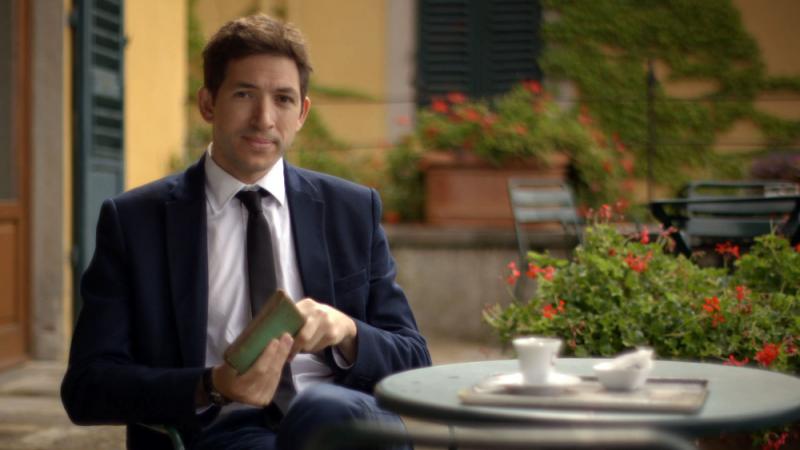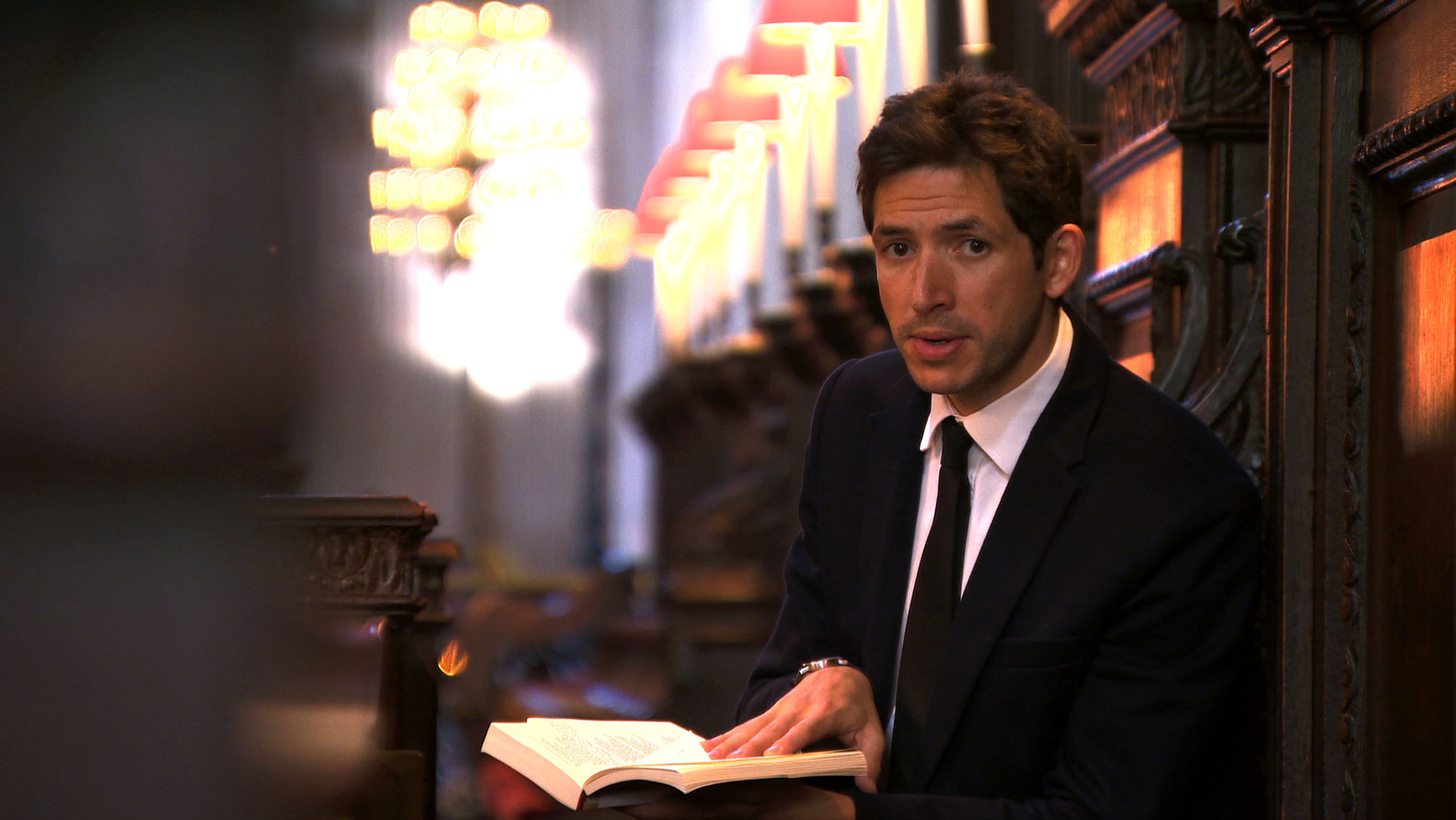A Very British Renaissance, BBC Two | reviews, news & interviews
A Very British Renaissance, BBC Two
A Very British Renaissance, BBC Two
Sections of inspired elucidation let down by sometimes crass script and sound effects

The miscellany, a varied collection of works on different topics, was originally a Renaissance concept, an opportunity to bulk up a single volume with a diverse assortment of topics. The concept kept coming back to me, watching this peculiar programme, in places coherent and persuasive, in others curiously perverse, as if form and content had been devised by different people.
The programme began predictably enough, like the Renaissance, in Italy, with a Lonely Planet-style recapitulation of Michelangelo's David and the Florence Duomo. It was when we got back to Britain that the weirdness began. As Fox trudged through the coastal mud, imagining himself to be one of the continental intellectuals arriving in isolated, backwoods Britain, the soundtracked twanged cowboy-style steel guitar riffs. It was spectacularly crass, and any viewer still dreaming of polyphony and the Duomo will have felt utterly disoriented. Perhaps the cowboys just hid them well, but the wild west was always believed to be rather short of perpendicular Gothic cathedrals and the works of Chaucer.
Unlike the programme’s other European immigrants, Damian was no great intellectual
Fox’s historical scene-setting was also rather hit and miss. “The Renaissance is supposed to have passed Britain by,” Fox assured us. Who supposes that? Fox didn’t say. Broadly understood, the Renaissance is inseparable from the Reformation, which (among other things) depended on the reinvigorated scholarship kicked off by the Renaissance, and led to the Protestant Church, Cranmer’s Bible, the language of Shakespeare, and quite a lot of other things most people who are at all concerned about the Renaissance will be familiar with.
Eventually, when Fox had a sensible story to tell, the programme improved a lot. He began with the stories of a few expert, cultured European arrivals in Britain, who sowed the Renaissance seed. Some of these, such as the painter Hans Holbein, are indisputably important, and Fox’s portrait of the great Swiss-German was expertly sketched. Others, like the section on German sundial craftsman Nicolaus Kratzer, were a curiosity; while the story of John Damian, an Italian alchemist at the court of James IV of Scotland, was simply bizarre.

Unlike the programme’s other European immigrants, Damian was no great intellectual. His place in history now mostly rests on his attempt in 1507 to fly from the ramparts of Stirling Castle wearing wings improvised from chicken feathers. He broke his leg. The fact that he wasn’t killed (it’s a long way down) was interpreted by Fox as evidence that his wings must have had some effect, and his leap, the cause of widespread hilarity among his contemporaries, therefore an important event in the history of human flight. (At this point a fat pig also leaped from the ramparts, managing to stay airborne longer than Damian, before declaring the episode a shabby and transparent attempt at Scottish tokenism to justify the “British” in the programme’s title.)
After that, things could only get better. Fox was amusing and engaging on Holbein, Thomas Tallis and the poet Sir Thomas Wyatt. The exploration of the stunning Elizabethan house Longleat, the first built following continental models was fascinating, only spoiled - again - by ridiculous choice of music. Why, in a programme arguing for a more accurate understanding of cultural influence, would you play a 19th-century Viennese waltz to illuminate a 16th-century English house in the Italian style?
Let’s hope next week Fox has edited his script better, and set about his audio effects assistant with one of the gruesome instruments of torture that the Renaissance religious community - due a higher profile in weeks to come - spent such ingenuity devising.
rating
Explore topics
Share this article
Add comment
The future of Arts Journalism
You can stop theartsdesk.com closing!
We urgently need financing to survive. Our fundraising drive has thus far raised £49,000 but we need to reach £100,000 or we will be forced to close. Please contribute here: https://gofund.me/c3f6033d
And if you can forward this information to anyone who might assist, we’d be grateful.

Subscribe to theartsdesk.com
Thank you for continuing to read our work on theartsdesk.com. For unlimited access to every article in its entirety, including our archive of more than 15,000 pieces, we're asking for £5 per month or £40 per year. We feel it's a very good deal, and hope you do too.
To take a subscription now simply click here.
And if you're looking for that extra gift for a friend or family member, why not treat them to a theartsdesk.com gift subscription?
more TV
 Coldwater, ITV1 review - horror and black comedy in the Highlands
Superb cast lights up David Ireland's cunning thriller
Coldwater, ITV1 review - horror and black comedy in the Highlands
Superb cast lights up David Ireland's cunning thriller
 Blu-ray: The Sweeney - Series One
Influential and entertaining 1970s police drama, handsomely restored
Blu-ray: The Sweeney - Series One
Influential and entertaining 1970s police drama, handsomely restored
 I Fought the Law, ITVX review - how an 800-year-old law was challenged and changed
Sheridan Smith's raw performance dominates ITV's new docudrama about injustice
I Fought the Law, ITVX review - how an 800-year-old law was challenged and changed
Sheridan Smith's raw performance dominates ITV's new docudrama about injustice
 The Paper, Sky Max review - a spinoff of the US Office worth waiting 20 years for
Perfectly judged recycling of the original's key elements, with a star turn at its heart
The Paper, Sky Max review - a spinoff of the US Office worth waiting 20 years for
Perfectly judged recycling of the original's key elements, with a star turn at its heart
 The Guest, BBC One review - be careful what you wish for
A terrific Eve Myles stars in addictive Welsh mystery
The Guest, BBC One review - be careful what you wish for
A terrific Eve Myles stars in addictive Welsh mystery
 theartsdesk Q&A: Suranne Jones on 'Hostage', power pants and politics
The star and producer talks about taking on the role of Prime Minister, wearing high heels and living in the public eye
theartsdesk Q&A: Suranne Jones on 'Hostage', power pants and politics
The star and producer talks about taking on the role of Prime Minister, wearing high heels and living in the public eye
 King & Conqueror, BBC One review - not many kicks in 1066
Turgid medieval drama leaves viewers in the dark
King & Conqueror, BBC One review - not many kicks in 1066
Turgid medieval drama leaves viewers in the dark
 Hostage, Netflix review - entente not-too-cordiale
Suranne Jones and Julie Delpy cross swords in confused political drama
Hostage, Netflix review - entente not-too-cordiale
Suranne Jones and Julie Delpy cross swords in confused political drama
 In Flight, Channel 4 review - drugs, thugs and Bulgarian gangsters
Katherine Kelly's flight attendant is battling a sea of troubles
In Flight, Channel 4 review - drugs, thugs and Bulgarian gangsters
Katherine Kelly's flight attendant is battling a sea of troubles
 Alien: Earth, Disney+ review - was this interstellar journey really necessary?
Noah Hawley's lavish sci-fi series brings Ridley Scott's monster back home
Alien: Earth, Disney+ review - was this interstellar journey really necessary?
Noah Hawley's lavish sci-fi series brings Ridley Scott's monster back home
 The Count of Monte Cristo, U&Drama review - silly telly for the silly season
Umpteenth incarnation of the Alexandre Dumas novel is no better than it should be
The Count of Monte Cristo, U&Drama review - silly telly for the silly season
Umpteenth incarnation of the Alexandre Dumas novel is no better than it should be
 The Narrow Road to the Deep North, BBC One review - love, death and hell on the Burma railway
Richard Flanagan's prize-winning novel becomes a gruelling TV series
The Narrow Road to the Deep North, BBC One review - love, death and hell on the Burma railway
Richard Flanagan's prize-winning novel becomes a gruelling TV series

Comments
I thought the programme was
Thank you Catherine. I too
The program confirmed to me
Only got as far as Henry